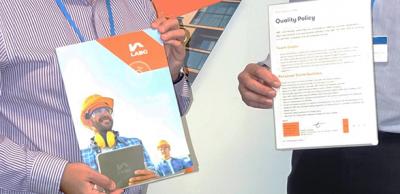Building on Brexit: An All Party Parliamentary group (APPG) Report
Brexit could prove disastrous for the delivery of new homes and infrastructure unless transitional arrangements are put in place to allow the construction industry to easily draw on EU workers while it skills up a domestic workforce in greater numbers.
The warning comes from a Commission of Inquiry of the All Party Parliamentary Group for Excellence in the Built Environment in a new report Building on Brexit. Chaired by Oliver Colvile; the cross-party group of parliamentarians points out the perfect storm of an ageing workforce and more people leaving the industry than entering, which is creating a skills crisis even without Brexit.
Making the construction industry SAFE
In the Executive summary Colvile says ’The challenges ahead will certainly be tough – but too much is at stake for it to fail. It is essential that Government and industry come together to make the sector SAFE (Stabilise, Attract, Future-proof and be more Enterprising).’
That is:
- Stabilise: Government stabilises the existing workforce by announcing existing EU migrant workers are able to remain in the UK. Transitional arrangements are then put in place for a period of time so that access to foreign workers does not fall off a cliff edge.
- Attract: Government and industry work together to put in place a seamless training infrastructure which ensures we attract and train the right talent across the built environment spectrum that is needed to deliver a high-quality output.
- Future-proof and Enterprise: Industry must step up to the plate and become future proof, more productive and enterprising by harnessing digital technologies and offsite construction and also by encouraging disruptors into the market.
12-point plan for the future post-Brexit
The report sets out a 12-point plan to deal with the impact of Brexit on skills and for modernising the industry to become more competitive and productive going forward.
1. Ensure at the earliest opportunity an unconditional and permanent right to residence and work for existing EU nationals employed in UK construction.
2. Develop a workable skills-based migration system that provides access to overseas workers.
3. Secure reciprocal arrangements to allow global construction companies to move their staff to different locations to deal with peaks and troughs of workload.
4. Provide temporary visas for ‘posted’ EU workers employed by overseas companies on specific contracts.
5. Allow non-UK construction students opportunities to remain and work in the sector for a set period of time following the completion of studies.
6. Ensure, more generally, that the built environment sector is given the priority and support it deserves and that befits such a vital and important industry in the course of Brexit negotiations and withdrawal from the EU.
7. As part of Brexit negotiations ensure that there remains continued mutual recognition of qualifications for professionals working in the built environment.
8. We urge the industry to get behind an overarching ambition to attract, train and retain a greater domestic workforce, with skills aligned to more modern ways of working.
9. We need industry, with strong support and assistance from Government, to set up and shape a pivotal skills body for the entire built environment, to provide strategic oversight across the spectrum from the trades to the professions.
10. Having two training levies in the sector is unviable and confusing. We would like to see the CITB levy and the apprenticeship levy consolidated and simplified into one and the money ring-fenced so it is spent within the built environment to attract and train new talent with the skills for today and the future.
11. Government has recently reaffirmed its commitment to a strong industrial strategy and is planning to form sector deals with key industries. We advocate that increasing productivity must be at the heart of the construction sector deal brought about by greater training and moves to use more modern and digital construction.
12. The construction industry needs to keep up the momentum in the harnessing of building information modelling and that requires Government to reaffirm its commitment to mandating level 2 building information modelling on centrally funded Government projects and ensure this mandate is enforced.
Further information
Sign up to the building bulletin newsletter
Over 48,000 construction professionals have already signed up for the LABC Building Bulletin.
Join them and receive useful tips, practical technical information and industry news by email once every 6 weeks.
Subscribe to the Building Bulletin




Comments
(No subject)
Submitted 6 years 6 months ago
(No subject)
Submitted 6 years 6 months ago
Webmaster note
Submitted 6 years 6 months ago
Ychwanegu sylw newydd